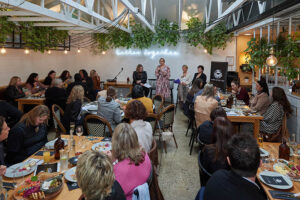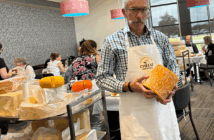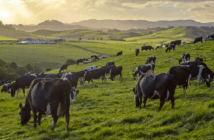
Meat Business Women began in the UK with founder and chair Laura Ryan believing passionately that the meat sector could offer women a rewarding career.
With no family ties to the meat industry, Ryan fell into the sector after graduating from university and landing a job as a marketing manager for a meat wholesaler.
As her career progressed and her roles became more senior, she began to realise she was often the only woman in the room.
“While I felt that I had found my perfect career, it became apparent that the perceived image of the industry is not one that always appeals to new talent and that the industry lacks networking opportunities for like-minded, ambitious people,” Ryan says.
In 2015 she launched Meat Business Women, a global professional group for females working in the industry to ensure the sustainability of the sector by attracting and retaining the best possible talent.
The group set out with three objectives: to improve the image of the industry to women; to nurture new entrants through education and mentoring; and to improve networking.
It wasn’t long before the organisation had more than 5,500 members in the UK, Ireland, Australia, New Zealand, and the USA and was being recognised by the United Nations as a contributor to their Sustainable Development Goals.
In 2019, co-founder of Global Meat Alliance and CEO of World Butchers’ Challenge, Ashley Gray, launched the New Zealand committee after meeting Ryan at a conference in 2016 and having seen some of the initiatives she launched in the UK.
“Having been in the industry for over 10 years now even in my own peer group I faced some barriers,” says Gray.
“If you think traditionally of the meat industry as being abattoirs and butchers, there are the old boys’ club type scenarios, but now there is a positive opportunity to educate people a little more.
“The United Nations put a challenge to Meat Business Women. They recognised we were doing some really good work, but they wanted to see tracking and progress made,” Gray says.
In 2020 Meat Business Women shared its first international report on gender representation in the meat industry which they believe is the first of its kind.
The report outlined the following five key themes: ‘Changing perceptions of the sector’; ‘Moving inclusion up the agenda’; ‘Tackling the broken career ladder’; ‘Strengthening networks and creating visible role models’; and ‘The way we work doesn’t work’.
“Traditionally we see women heavily represented in junior roles in finance, HR or marketing departments, but those types of roles are rarely steppingstones for the more senior operational roles in the businesses,” Gray says. “It’s about creating pathways rather than women getting stuck on that career ladder.”
Every participating nation with a branch of Meat Business Women has a territory partnership with an organisation in the country responsible for the ownership of the committee. In New Zealand, this is a partnership with Beef and Lamb New Zealand Inc, Beef and Lamb New Zealand Ltd, and the Retail Meat Industry Association.
In May this year, a campaigned called “She Looks Like Me” was launched in the UK and Australia. This campaign showcases the diversity amongst women working in the meat industry via short video clips and the New Zealand committee is planning a few of their own to share some of the stories in our own backyard.
The next task will be to do further research for the Inspire, Network, Grow: Gender Representation in the Meat Sector report to see how the industry is tracking.
“Outside the gender scope we are also going to add in a diversity pillar as well in terms of ethnicity and background, while we are focussing on women, it is shifting more into ensuring diversity across the board,” Gray says.
“I’ve been super lucky working with my mentors and many of my role models have been males. Just as it’s important to talk about and address the problems we have it’s also important to celebrate that there’s a lot of really great things happening in the New Zealand sector. We are really lucky, and we want to champion that.”
If you’d like to join the Meat Business Women community for access to all initiatives, mentoring platforms, masterclasses and priority access to events, visit www.meatbusinessowomen.org.




























































































